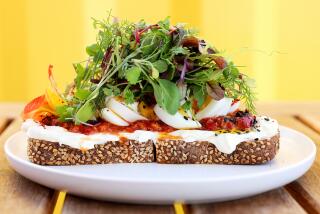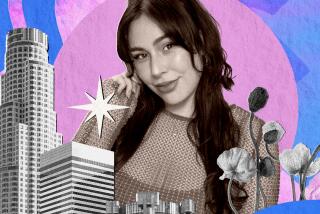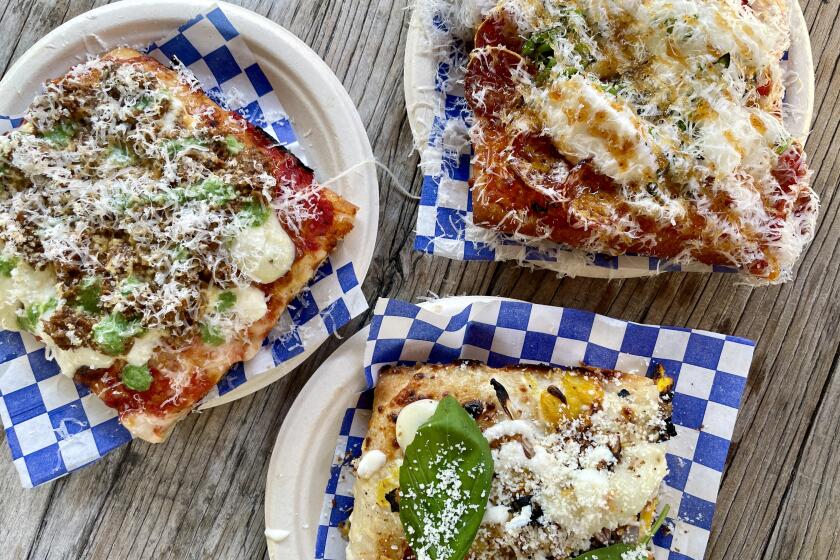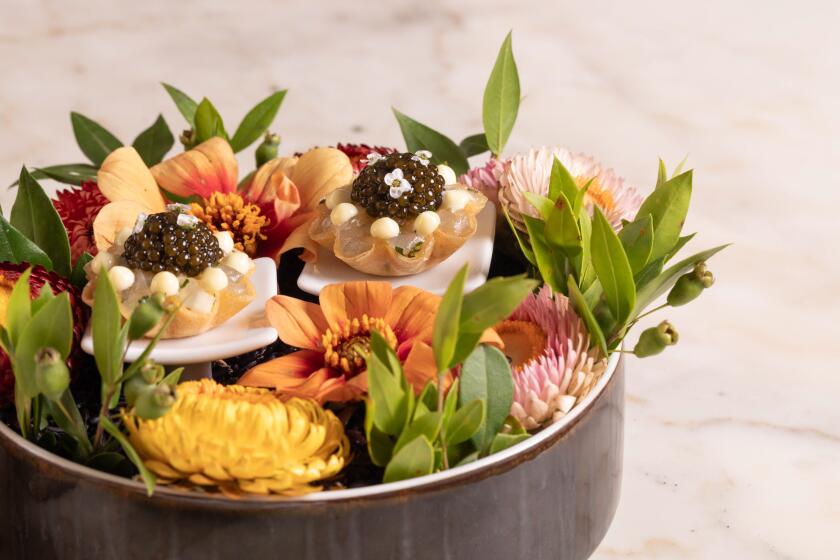Artisans of the roast
A great cup of coffee starts with great beans. As recently as 10 years ago, finding good whole bean coffee usually meant seeking out the little gourmet shops that imported it, finding a Peet’s or Illy store -- or having an Italian (or Guatemalan) grandmother who could send a burlap bag of the stuff to you. But lately, a new breed of small, independent microroasters have set up shop in and around the city, and they’re paying a kind of attention to coffee that we haven’t seen before.
They’re sourcing their own beans at “origin,” finding local growers (in some cases, they are the local growers), making estate blends, often championing sustainable farming methods and roasting in small batches that highlight the intrinsic flavors -- the “terroir” of the coffee beans -- instead of over-roasting them into charcoal oblivion.
Much of the coffee is Fair Trade and organic -- but not as much as you might think. Instead of relying on expensive certification from third-party middlemen (albeit well-meaning middlemen), many independent roasters believe in buying directly from the sources, often paying higher market prices for the beans than the chains, letting the quality speak for itself and trusting that a long-term relationship with the growers will in effect practice what Fair Trade preaches.
Here in Los Angeles, a number of microroasters are jumping into the fray -- or the quality gap often left in the wake of the behemoth chains that pioneered what’s called the “second wave” of coffee. (The first wave happened after World War II, with the advent of canned coffee; the third wave is what’s happening right now.) The best of them (listed below alphabetically) are bringing attention to detail and devotion to the process that shows where it counts -- in the cup.
Antigua Traditional Roasters. Antigua co-owner Yancey Quinones comes from a family that has been growing coffee in Guatemala for more than 150 years, but his commitment to community is as much about his East L.A. neighborhood as it is about his family’s farm. He roasts his family’s coffee -- grown on 4,000 acres at an elevation of about 5,000 feet -- as well as other beans he sources at origin, in a Primo roaster lodged in the back of his cozy, art-filled neighborhood coffee shop. Quinones’ path to becoming a microroaster includes a degree in economics and a healthy dose of activism. He works with the Youth Opportunity Movement program and Barrio Action when he’s not sourcing and roasting coffee -- or practicing latte art. 4836 Huntington Drive, Los Angeles. (323) 539-2233. www.antiguacoffeehouse.com.
City Bean Coffee. At City Bean in Culver City, co-owner Sol Salzer roasts all of his beans on a 1926 Probat roaster that he had rebuilt with state-of-the-art technology -- it’s a machine he loves and considers the key to the kind of coffee he creates -- he’s as focused on the fine points of roasting as on the selection of the beans. Open since 1991, City Bean has small retail shops in Century City and downtown, but the bulk of its business is conducted online. “One year Pinots are great and Cabs are just OK,” says Salzer. “It works that way with coffee too. Certain years I get a Sumatra that I can’t get enough of; the next year it falls flat.” This year he’s excited about Ethiopian coffee. He has a beautiful Ethiopian Yergacheffe and has just sourced a Harrar he really likes. And from Belo Horizonte, Brazil, he has an extraordinary Fazenda Vista Allegre (on the menu at the wine bar Bin 8945) with notes of caramel and tobacco and a depth of flavor it gets from drying on the tree for three months. 5801 W. Washington Blvd., Culver City. (323) 965-5000. www.citybean.com.
The Coffee Cellar. This little roaster operates out of a downtown eatery, Mama’s Tamales, using a single-batch roaster nestled in a back room, between a delivery alley and a busy kitchen. Angel Orozco runs the small business himself, using a 7-pound Primo roaster to roast beans he sells at the Silver Lake farmers market and online, in addition to supplying Erewhon Natural Foods Market in Hollywood. He makes a mean cup of espresso behind the counter too. After getting a masters in Urban Planning from UCLA and working with organic farmers in Guatemala, Orozco started roasting at home as a hobby -- and then realized there was a need for marketing organic coffee. About 80% of the beans he uses are Fair Trade, organic and shade-grown, as it’s a “niche market” that Orozco feels strongly about supporting -- at least until his business is big enough for him to buy directly from the farmers. “I got started working with sustainable agriculture,” he says. Though most of his beans are from Latin America, he has Ethiopian and Sumatra coffees that he really likes right now. His current favorite is an El Salvadoran -- though normally, he prefers his espresso blend. 2124 W. 7th St., Los Angeles. (213) 305-4484. www.coffeecellar.com.
Graffeo. This Beverly Hills outpost of the 55-year-old San Francisco company sells just three roasts (light, dark and decaf) in its marble-and-burlap storefront. All are roasted on-site in the huge Sivetz roaster that looms behind a glass wall like a giant mechanical diamond under glass. The light and dark blends are made of the same mixture of Costa Rican, Columbian Colsuaves and Papua New Guinea Koban beans, the difference being the length of time they spend in the roaster. The decaf is from Columbian beans, which have been Swiss water processed. 315 N. Beverly Drive, Beverly Hills. (310) 273-0817. www.graffeo.com.
Groundwork Coffee Co. This Los Angeles coffee company began life in 1992 as the Gourmet Coffee Warehouse but reinvented itself in 2000 in an effort to “go beyond Fair Trade,” says owner Ric Rhinehart. In addition to its Culver City roasting facility, where beans are roasted on a 60-kilogram, handmade Balestra roaster, Groundwork has five retail shops around town -- and it’s about to open a sixth, in downtown L.A. Rhinehart cites 10 attributes he looks for when sourcing and roasting coffee, but he says what he’s looking for most is flavor. “Most of the world is trying to buy the absence of defect,” he says. “We’re trying to find the presence of positive nuance.” And special toys don’t hurt: The new store will sport a new Clover coffee maker, a state-of-the-art Seattle machine that makes one brewed cup at a time. Rinehart plans to offer coffees brewed to-order by the cup -- served with as much care as wines by the glass at a wine bar. Try an El Salvador Malacara, an organic Nicaraguan Cinco de Junio -- or, if you’re feeling flush, a Esmeralda Especial Geisha, which won the 2006 Panama Cup of Excellence award and went for $50 a pound raw at auction. Roasted and bagged, that works out to $150 a pound. 811 Traction Ave., Los Angeles. (213) 626-8650. (Four additional locations.) www.lacoffee.com.
Jones Coffee Roasters. In a Pasadena warehouse, the Jones family completes the grower-to-barista chain. Mireya Asturias Jones grew up on her grandfather’s coffee farm in Guatemala, but it wasn’t until her sons got into the business that Jones Coffee Roasters came into being. Ten years ago, the family opened up its own artisan roasting business -- and six months ago moved into their new digs, where the beans (60% of which come from their farm) are roasted in the same warehouse that houses the small retail shop. Mireya’s son, Chuck Jones, says that when he sources and roasts coffee, he’s looking for “sweetness and a long finish,” qualities Jones says are most easily lost during roasting. With the Probat roaster firing alongside burlap stacks of green coffee while Mireya and Chuck pull shots of espresso and chat with the locals, it’s a coffee microcosm under one roof. 537 S. Raymond Ave., Pasadena. (626) 564-9291. www.jonescoffee.com.
Kean Coffee. After Martin Diedrich ended his affiliation with Diedrich Coffee and started over (see The Find), he opened this Newport Beach coffeehouse and roasting facility. Here Diedrich -- who grew up on his family’s Guatemalan coffee farm -- uses a roaster built for him by his brother (whose specialty roasters number more than 3,000), operates a wholesale business and serves up some amazing coffee. Diedrich produces only two blends -- both espresso -- as he believes in focusing on the “unique potential” of single-origin beans, which he compares to fine wines. Among his current offerings are an Indonesia Timor Peaberry, an Indonesia Sumatra and a pure Kona. 2043 Westcliff Drive, Suite 100, Newport Beach. (949) 642-5326. www.keancoffee.com.
LA Mill Coffee. Alhambra-based LA Mill has been operating since 1997, roasting its beans on a Probat G60 specialty drum roaster. Owner Craig Min says he makes an effort to look for Fair Trade coffees, but like City Bean’s Salzer, he prefers going directly to the farmers. He’s also set to launch an organic program in the coming weeks. “Everything here at our plant is roasted to order,” Min says. It isn’t sold until the next day, he says, so that “it has time to de-gas and develop.” Coffee beans need resting time after they’ve been roasted, he explains; “I like a 48-hour coffee -- it’s at it’s peak.” And what’s the bean that gets his pulse racing? He likes an organic Ethiopian Sidamo select that just came in, but his favorite region is the Harrar in Ethiopia, which produces beans with “nice fruitiness and blueberry tones.” Min says he is scouting real estate in Old Town Pasadena and Beverly Hills for an upcoming retail shop; in the meantime, LA Mill’s beans are available online, in restaurants such as Providence and at Robin’s Nest in Venice. 1112 Westminster Ave., Alhambra. (626) 202-0322. www.lamillcoffee.com.
Supreme Bean. This North Hollywood-based wholesale company roasts its coffee in a Primo drum roaster in a pristine facility outfitted with a state-of-the-art water purifying system for its cupping room (imagine a jewelry store crossed with a meth lab). Here the focus is as much on the quality of the bean as on the roast. “Every bean has a sweet spot,” says co-owner Jeffrey Chean. In roasting, “you see what a bean is capable of doing and look for as few defects as possible.” In sourcing, Chean looks for the “heredity” of the beans, preferring beans from old root stock to hybrid plants, which he says often have a “washed-out quality.” He views coffee musically. “A blend is a chord, for instance; you want base notes, high notes.” 5457 Cleon Ave., North Hollywood. (818) 506-6020. www.thesupremebean.com.
More to Read
Eat your way across L.A.
Get our weekly Tasting Notes newsletter for reviews, news and more.
You may occasionally receive promotional content from the Los Angeles Times.







